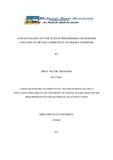Please use this identifier to cite or link to this item:
https://cris.library.msu.ac.zw//handle/11408/3323Full metadata record
| DC Field | Value | Language |
|---|---|---|
| dc.contributor.author | Chigogora, Percy Victor | - |
| dc.date.accessioned | 2018-11-08T14:32:06Z | - |
| dc.date.available | 2018-11-08T14:32:06Z | - |
| dc.date.issued | 2017 | - |
| dc.identifier.uri | http://hdl.handle.net/11408/3323 | - |
| dc.description.abstract | A qualitative study to determine the capacity of rural communities in emergency preparedness and response for cholera emergencies was carried out in three wards of Zaka rural district. The vulnerability of communities to health disasters warranted the need to explore the cholera preparedness of the Zaka communities. A descriptive survey was used in the study .Household interviews were conducted on forty (46) respondents, four (4) Key informants from the two (2) rural health centres were also interviewed and two (2) Focus groups discussions were conducted with the Health Centre Committees of wards 14, 16 and 21. Purposive sampling was done to select wards and Key informants and random sampling was used to select households that participated in the study. Descriptive statistics based on themes, numbers and codes were used to summarize and describe the research results obtained from the questions completed by the health staff and interviews conducted with villagers in the 3 wards. The research findings showed that the Zaka community lacked capacity in emergency preparedness and response; there were no emergency preparedness and response plans for the wards, there were no committees responsible for planning for emergencies, all staff members and communities were not trained in emergency preparedness and response. There was no involvement of community in analysing disease statistics for their area, mitigation measures implemented were from top down planning process, no community initiatives were in place. There were no resources set aside by the community and households for emergencies. Hygiene practices of the community in terms of faecal disposal and hand washing had deteriorated, 41.3 % were practicing open defecation, 100% did not have hand washing facilities and 90 % used run to waste method without soap for hand washing, and these practices put the community at risk of transmission of diarrhoeal diseases. The researcher recommended training of health workers first then community structures on emergency preparedness and response using staggered lessons as a way of circumventing unavailability of funds and the inclusion of emergency preparedness and response planning on the roles of the Health Centre Committees since they were visibly functioning on health development matters at the clinics Some of the recommendations proffered are as follows:. adoption of simple, affordable methods of excreta disposal like the upgradeable Blair toilet in order to reduce open defecation , installation of tippy taps with locally available materials, intensification of health promotion through Village Health Workers and Health clubs. | en_US |
| dc.language.iso | en | en_US |
| dc.publisher | Midlands State University | en_US |
| dc.subject | Rural communities | en_US |
| dc.subject | Emergency preparedness | en_US |
| dc.subject | Response | en_US |
| dc.subject | Health disasters | en_US |
| dc.title | An investigation into the state of preparedness and response capacities of the Zaka communities to cholera outbreaks | en_US |
| item.languageiso639-1 | en | - |
| item.fulltext | With Fulltext | - |
| item.grantfulltext | open | - |
| Appears in Collections: | Master’s Degree In Adult Education | |
Page view(s)
314
checked on Feb 25, 2026
Download(s)
398
checked on Feb 25, 2026
Google ScholarTM
Check
Items in MSUIR are protected by copyright, with all rights reserved, unless otherwise indicated.




